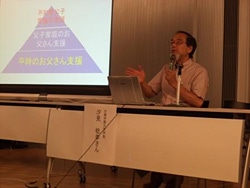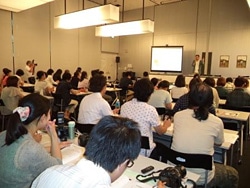



[23 August 2013, MORIOKA, JAPAN]
 |
| © Japan Committee for UNICEF |
| More than 50 personnel from local child-rearing support centers, preschools and municipal governments in areas heavily damaged by the tsunami participated in the symposium at Aiina Center, an information exchange center in Morioka (Iwate). Many attendees had also participated in Fathering Assistance Training Workshops. |
The Great East Japan Earthquake highlighted the need for a system relating to children and child-rearing assistance. Efforts targeting the role of fathers are still limited. While the number of fathers who enjoy child-rearing is steadily rising, child-rearing assistance providers face the difficult challenge of figuring our how to empower fathers to carry out their duties when times are tough, and how the assistance community can best support them.
Roughly six months after the disaster the Japan Committee for UNICEF (JCU) joined NPO Niiza Childcare Support Network and municipal governments in Iwate, Miyagi and Fukushima to launch the Single-Father Household and Fathering Assistance Project. Two years have passed since then. In Iwate, the Iwate Child-rearing Support Center have held Iwate Child-Rearing Assistance Trainers' Workshops several times a year, and as part of these workshops various reports from lessons learned in the field were shared by specialists and practitioners regularly involved in child-rearing assistance for men. A Symposium on Fathering Assistance in Iwate was also held to create an opportunity for these practitioners to consider the role of assistance to fathers.
On 23 August at Aiina Center, an information exchange center in Morioka (Iwate), more than 50 people came together for a symposium. Participants included staff from child-rearing centers, preschools and municipal governments across Iwate, including the coastal areas that were heavily damaged by the tsunami. Many participants had also previously participated in Fathering Assistance Training Seminars.
During the first part of the symposium, attendees participated in a Father Assistance Training Workshop taught by Katsuhisa Maekawa, from civic group Odotsanzu (which means "father" in the local coastal Iwate dialect), an organization that had held picture book readings for children in Miyako since before the disaster. Next, a workshop was led by Rie Yamaya from NPO Inclu Iwate, an organization that has started assistance for single-father households in addition to single-mother households. Miyoko Ito from NPO Assist F1, an organization that currently supports three single-father households, reported on how Assist F1 has utilized resources such as available subsidies for the Single-father Household and Fathering Assistance Project to implement assistance. Yoshimoto Sato from Iwate Prefecture's Health and Welfare Division (Children and Families Section) also introduced the prefectural government's efforts, including the placement of child and family assistance experts and training for how to assist families where a child has lost one or more parent.
 |
| © Japan Committee for UNICEF |
| "We need assistance that galvanizes fathers' interests in child-rearing. Fathers must acknowledge the need to ask for help when times are tough by practicing removing their defensive 'armor'," says Toshiyuki Shiomi of Shiraume Gakuin College. |
Toshiyuki Shiomi of Shiraume Gakuin College participated in the symposium as an advisor and offered commentary from his specialist perspective in pedagogy, pedagogical anthropology and child education: "In the West, declining birth rates became apparent from the 1930s, sparking a movement where by the 1980s efforts were being made to send fathers home early from work, such as by reducing working hours. In Japan, however, there are records that show that during the Edo Period Japanese fathers were much more involved in child-rearing than many other countries. We need assistance that galvanizes fathers' interests in child-rearing. Fathers must acknowledge the need to ask for help when times are tough by practicing removing their defensive 'armor'."
Sharing his own experience, sometimes humorously, actively raising his own three children, Mr. Shiomi explained the importance of fathers participating in child-rearing and for assistance to fathers.
Mr. Shiomi also participated in a subsequent round-table discussion entitled "Fathering assistance in Iwate from the perspective of reconstruction". Mr. Shiomi pointed out that mothers' relationships with their children begin with the process of giving birth, but fathers must build a relationship through interaction." Next, Mr. Shiomi shared the stage with Mr. Maekawa (Odotsanzu) and Mr. Sato (Iwate Prefecture's Health and Welfare Division) to have a candid discussion about their own experiences relating to the meaning and purpose of fathering assistance.
Symposium participants shared their thoughts with JCU following the event: "I live in Iwate, but there were things going on in my home prefecture that I didn't know about. The symposium was an opportunity to learn about those undertakings." "In addition to existing systems, fathers likely have other needs, such as support around the house." "It would be great if the prefectural government could create a new assistance scheme."
Child protection advisor Michiko Ono facilitated the symposium on behalf of JCU Great East Japan Earthquake Support Headquarters, and noted: "This opportunity underscored the importance of assistance even during times of peace, what is necessary for communities to support themselves, and the need to expand opportunities to provide assistance for consultations and exchanges in view of the third year following the disaster."